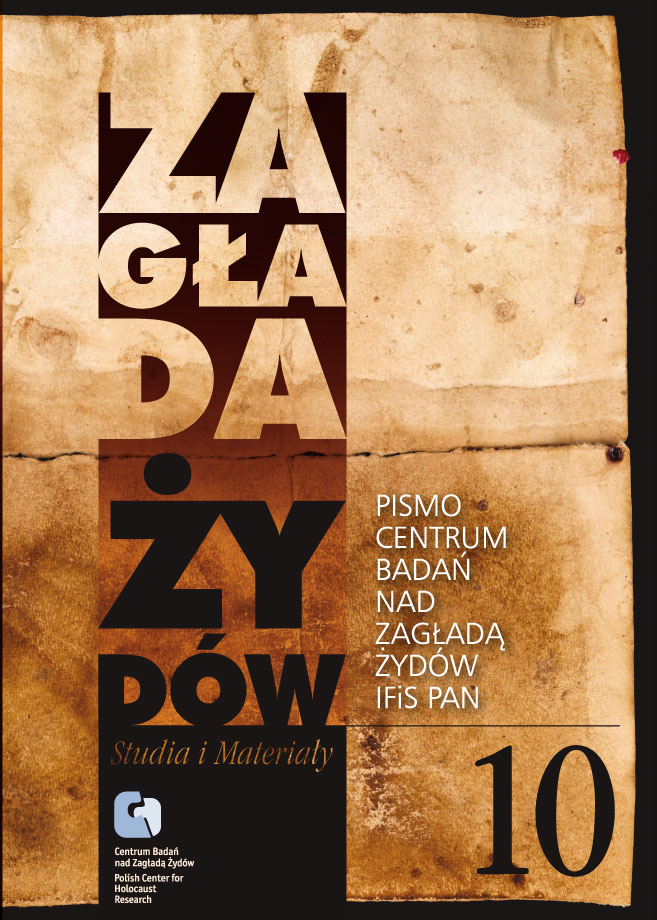Czy prawda nas wyzwoli? Przełamywanie oporu psychologicznego w przyjmowaniu wiedzy o Zagładzie
Zagłada Żydów. Studia i Materiały, Nr 10 (2014), Strony: 803-822
Data zgłoszenia: 2020-10-26Data publikacji: 2014-12-01
 https://doi.org/10.32927/ZZSiM.549
https://doi.org/10.32927/ZZSiM.549
Abstrakt
The introduction of the programs on Holocaust education in Poland and a broader debate on the transgressions of Poles against the Jews have not led to desired improvement in public knowledge on these historical events. A comparison of survey results from the last two decades (Bilewicz, Winiewski, Radzik, 2012) illustrates mounting ignorance: the number of Poles who acknowledge that the highest number of victims of the Nazi occupation period was Jewish systematically decreases, while the number of those who think that the highest number of victims of the wartime period was ethnically Polish, increases. Insights from the social psychological research allow to explain the psychological foundations of this resistance to acknowledge the facts about the Holocaust, and indicate the need for positive group identity as a crucial factor preventing people from recognizing such a threatening historical information. In this paper we will provide knowledge about the ways to overcome this resistance-through-denial. Implementation of such measures could allow people to accept responsibility for the misdeeds committed by their ancestors.
Słowa kluczowe
stosunki polsko-żydowskie , teoria tożsamości społecznej , opór psychologiczny
Licencja
Prawa autorskie (c) 2014 Autor&"Zagłada Żydów. Studia i Materiały"

Utwór dostępny jest na licencji Creative Commons Uznanie autorstwa 4.0 Międzynarodowe.
https://creativecommons.org/licenses/by/4.0
Czasopismo publikowane jest w standardzie Diamond Open Access na licencji CC-BY-4.0 Deed - Uznanie autorstwa 4.0 Międzynarodowa - Creative Commons
Inne teksty tego samego autora
- Michał Bilewicz, Nie tylko o „Strachu”. Psychologia potocznego rozumienia historii , Zagłada Żydów. Studia i Materiały: Nr 4 (2008)
- Michał Bilewicz, Karolina Marcinkowska, Społeczna psychologia Holokaustu: od naiwnego sytuacjonizmu do zrozumienia roli ideologii , Zagłada Żydów. Studia i Materiały: Nr 20 (2024)
Podobne artykuły
- Justyna Majewska, „Czym wytłumaczy Pan…?” Inteligencja żydowska o polonizacji i asymilacji Żydów w getcie warszawskim . , Zagłada Żydów. Studia i Materiały: Nr 11 (2015)
- Elżbieta Janicka, Instead of negationism. The symbolic topography of the former Warsaw ghetto vis-à-vis Holocaust narratives , Zagłada Żydów. Studia i Materiały: Nr Holocaust Studies and Materials (2017)
- Marcin Przegiętka, Wojciech Jakubowski, Atlas systemu rządów III Rzeszy Niemieckiej, cz. I: Instytucje władzy , Zagłada Żydów. Studia i Materiały: Nr 21 (2025)
- Roni Stauber, Filip Friedman i początki badań nad Zagładą , Zagłada Żydów. Studia i Materiały: Nr 11 (2015)
- Elżbieta Janicka, Zamiast negacjonizmu. Topografia symboliczna terenu dawnego getta warszawskiego a narracje o Zagładzie , Zagłada Żydów. Studia i Materiały: Nr 10 (2014)
- Katarzna Stec, Jolanta Ambrosewicz-Jacobs, Islands of Memory. The Landscape of the (Non)Memory of the Holocaust in Polish Education from 1989 to 2015 [Katarzyna Stec] , Zagłada Żydów. Studia i Materiały: Nr 17 (2021)
- Marcin Kula, Szuflada z dokumentami [Czarna księga, red. Wasilij Grossman, Ilja Erenburg, oprac. Joanna Nalewajko-Kulikov] , Zagłada Żydów. Studia i Materiały: Nr 17 (2021)
- Paweł Smoleński, Czy autor powinien być katonem? [Michał Wójcik, Zemsta] , Zagłada Żydów. Studia i Materiały: Nr 17 (2021)
- Michał Trębacz, „Cieszę się, że Państwo Putersznyt przeżyli wojnę i są ze sobą szczęśliwi”. Ryszard Lerczyński – jedyny łódzki Sprawiedliwy , Zagłada Żydów. Studia i Materiały: Nr 16 (2020)
- Zuzanna Schnepf-Kołacz, Losy pracowników niemieckiej gadzinówki „Nowy Kurier Warszawski” w świetle powojennych procesów z dekretu sierpniowego , Zagłada Żydów. Studia i Materiały: Nr 2 (2006)
<< < 1 2 3 4 5 6 7 8 9 10 11 12 13 14 15 16 17 18 19 20 21 22 23 24 25 26 27 28 > >>
Możesz również Rozpocznij zaawansowane wyszukiwanie podobieństw dla tego artykułu.
 English
English
 Język Polski
Język Polski



 https://orcid.org/0000-0001-5027-1691
https://orcid.org/0000-0001-5027-1691





